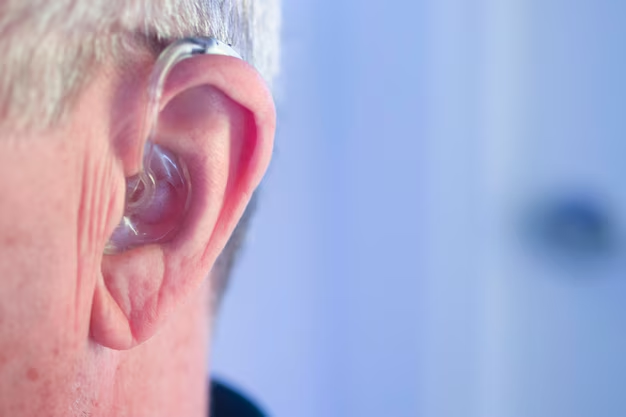Your Guide to How Much Will Medicare Pay For Hearing Aids
What You Get:
Free Guide
Free, helpful information about Medicare Insurance and related How Much Will Medicare Pay For Hearing Aids topics.
Helpful Information
Get clear and easy-to-understand details about How Much Will Medicare Pay For Hearing Aids topics and resources.
Personalized Offers
Answer a few optional questions to receive offers or information related to Medicare Insurance. The survey is optional and not required to access your free guide.
Wondering How Much Medicare Covers for Hearing Aids? Here's What You Need to Know!
Navigating the intricacies of Medicare can feel daunting—especially when it comes to coverage for essential items like hearing aids. Currently, Original Medicare does not cover hearing aids. This might come as a surprise considering the importance of good hearing to overall health, particularly for seniors. While this basic coverage doesn’t include the cost of hearing aids, there are ways to find financial support and alternative solutions.
Why Doesn’t Medicare Cover Hearing Aids?
The exclusion of hearing aid coverage under Original Medicare, which includes Part A and Part B, has its roots in the original legislative design of the program. At the time Medicare was enacted, and even today, hearing aids are considered non-essential or elective items, despite their critical role in maintaining quality of life and social interaction. Efforts to include hearing aids, such as proposed legislative changes, continue to be a topic of debate.
Are There Medicare Options?
Fortunately, Medicare Advantage plans (Part C) often offer coverage for hearing aids. These are private insurance plans that provide the same services as Original Medicare, but many come with additional benefits, including hearing, vision, and dental coverage. If you're considering a Medicare Advantage plan, it’s essential to:
- Research the specific plans available in your area to understand their coverage options.
- Compare costs and coverage details among different plans, as these can vary widely.
Exploring Financial Assistance Programs
While navigating Medicare, it's also wise to explore other government aid programs and financial assistance options. Consider the following resources:
State Assistance Programs
Many states offer assistance programs for audiology services and hearing aids. These programs typically provide support based on income eligibility and can significantly reduce the out-of-pocket costs for hearing aids.
Veterans Benefits
If you’re a veteran, you may qualify for hearing aids at no cost through Veterans Affairs (VA). The VA provides comprehensive hearing healthcare services, making it an excellent resource for eligible veterans.
Nonprofit Organizations
Organizations such as the Lions Club International often provide support for individuals in need of hearing aids. They collaborate with audiologists and other professionals to offer free or low-cost hearing aids for those who qualify.
Additional Financial Solutions to Consider
Finding funds for hearing aids might require some creativity. There are credit card solutions designed for healthcare expenses that offer affordable repayment terms. Here are a few options to consider:
- Healthcare credit cards: These cards provide low or zero interest rates if the balance is paid off within a specific promotional period.
- Personal loans: These may offer more favorable terms than traditional credit, especially if you have an excellent credit history.
- Flexible spending accounts (FSAs) or health savings accounts (HSAs): If you're still working or have a policy that includes these features, you can use these funds to pay for hearing aids tax-free.
By understanding how Medicare can fit into your broader financial plan and exploring these different avenues, you're better positioned to access the hearing aids you need without undue financial strain.
Financial Assistance and Resources at a Glance
- 📋 Medicare Advantage Plans: Explore plans offering hearing coverage.
- 🌟 State Assistance Programs: State-specific aid for hearing care.
- 🎖 Veterans Affairs Benefits: Healthcare and aid for veterans.
- 💖 Nonprofit Support: Apply for help from organizations like Lions Club.
- 💳 Healthcare Credit Solutions: Look into healthcare credit cards.
- 💰 Personal Loans: Often more favorable than standard credit.
- 🏦 FSAs/HSAs: Utilize these accounts for tax-free savings on expenses.
Evaluate these options carefully to find the best for your situation, and remember—proactive exploration of financial assistance can make a significant difference in improving your hearing health and quality of life.
What You Get:
Free Medicare Insurance Guide
Free, helpful information about How Much Will Medicare Pay For Hearing Aids and related resources.

Helpful Information
Get clear, easy-to-understand details about How Much Will Medicare Pay For Hearing Aids topics.

Optional Personalized Offers
Answer a few optional questions to see offers or information related to Medicare Insurance. Participation is not required to get your free guide.


Discover More
- Am I Elgible For Medicare
- Am I Enrolled In Medicare
- Am I Qualified For Medicare
- Are Adult Diapers Covered By Medicare
- Are Chemotherapy Drugs Covered By Medicare Part d
- Are Colonoscopies Covered By Medicare
- Are Covid Tests Covered By Medicare
- Are Cpap Machines Covered By Medicare
- Are Cpap Supplies Covered By Medicare
- Are Dental Implants Covered By Medicare
